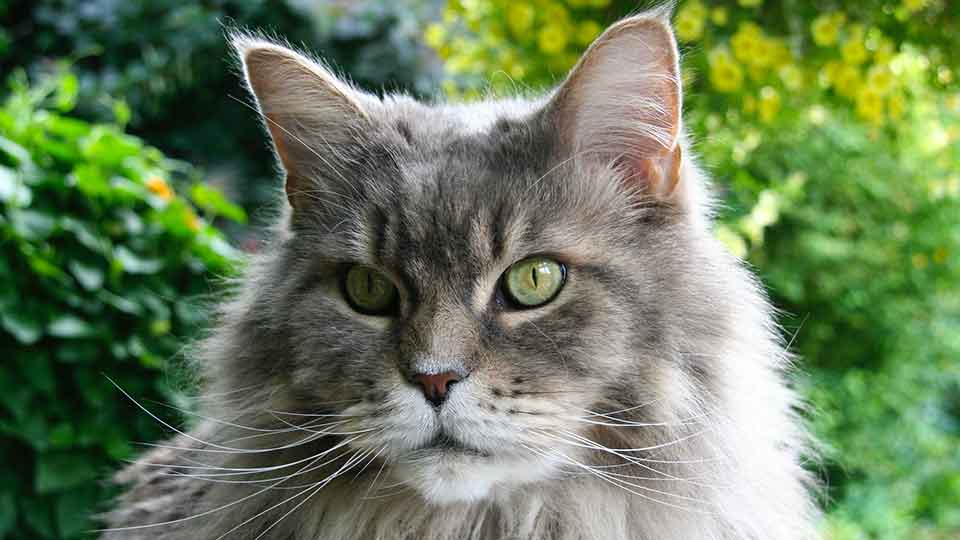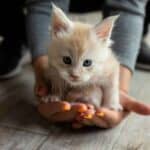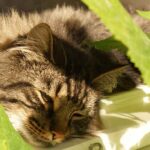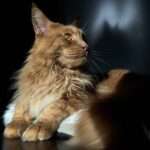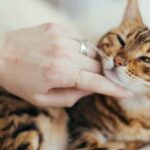Yes, you can keep a Maine Coon indoors.
Many people do, because Maine Coons are one of the most popular breeds of domestic cats, and they can adapt well to indoor life.
However, keeping a Maine Coon indoors requires extra care and attention, considering their extraordinary size.
The first thing you need to consider is enough space for them.
Maine Coons are large and active cats, and they need physical and mental stimulation to stay healthy and happy.
They also have long and thick fur, which needs regular grooming to prevent matting and shedding.
Before you decide to keep a Maine Coon indoors, you should learn more about this breed and think about everything carefully.
Why Maine Coon Needs A Larger Space?
Maine Coons, often called the “gentle giants” of the cat world, aren’t just large in size – they have big personalities to match!
Weighing up to 18 pounds and stretching up to 40 inches from nose to tail, these cats are all about action. They’re known for their playful nature, intelligence, and love for exploring.
This is why a larger space can be beneficial. It allows them to express their natural behavior: jumping, climbing, running, and investigating their surroundings.
A larger space means more opportunities for physical activity, which is crucial for their overall health.
Regular exercise helps prevent obesity, keeps their muscles toned, and their minds sharp.
Not to mention, it’s a fantastic way to prevent boredom, which in turn can lead to behavioral issues such as destructive behavior or excessive grooming.
However, it’s essential to remember that ‘space’ doesn’t only refer to physical space.
For a Maine Coon, space also includes vertical territory. They love to climb and watch over their domain from high places.
So, even in a smaller home, you can maximize space by providing climbing trees, shelves, or window perches.
Pros And Cons Of Keeping Cats Indoors
There’s a spectrum of opinions when it comes to keeping cats indoors.
On the one hand, indoor living protects cats from several hazards like road accidents, fights with other animals, harmful substances, or getting lost.
It also shields them from infectious diseases and parasites more common among outdoor cats.
However, life inside four walls can be less stimulating for a cat if not appropriately managed.
Cats are natural hunters and explorers, and the indoor environment may not provide the same level of physical exercise and mental stimulation that outdoor life offers.
This isn’t a reason to abandon the idea of keeping your cat indoors – it’s a call to action to make the indoor environment as enriching as possible! And this is where our main focus comes in.
Below are some pros and cons of being committed to having strictly an indoor cat that you can weight before getting a Maine Coon.
Pros:
- Increased safety from outdoor dangers like cars, predators, diseases, poisons, or getting lost.
- Longer average lifespan of 15-20 years vs. 2-5 years outdoors.
- Prevent harm to native wildlife like birds that outdoor cats may hunt.
- No risk of unwanted pregnancies, roaming, or fights with other outdoor cats.
- Easier to control their diet and limit unhealthy food intake.
- More socialization and stronger bonds formed with the family.
Cons:
- Requires more effort and interaction from owners to keep them stimulated and exercised.
- Increased risk of obesity without sufficient activity.
- More tracking of litter from boxes onto floors.
- Potential for boredom, anxiety, or destructive behaviors without enrichment.
- Need access to the larger indoor territory.
As you can see, the scales tip strongly in favor of the benefits of keeping Maine Coons strictly indoors.
But owners must put in the extra work to prevent issues like boredom that may arise.
Interactive playtime, puzzle feeders and toys, cat TV, and rotating novel objects to pique their curiosity are all helpful.
Can Maine Coon Cats Be Indoor Cats?
Absolutely! With proper care, enrichment, and space, most Maine Coons can adapt and thrive as indoor-only cats. Here are some key factors:
Personality
Not all Maine Coons have strong urges to roam outdoors. Selecting a kitten or cat with a mellow personality rather than a bold explorer can make them more suited to remaining indoors.
Early Indoor Upbringing
Maine Coons raised indoors from kittenhood usually transition easily into being indoor-only adults. They adapt to that lifestyle as their norm. Bringing in an outdoor cat can require more training.
Providing Vertical Space
Use cat trees, shelves, wall ledges, and other elevated perching spots to expand their territory upwards. This satisfies their climbing urges.
Mental Stimulation
Rotate puzzle feeders, food dispensing toys, treat balls, and interactive wands to engage their active minds. This prevents boredom.
Physical Exercise
Schedule at least 20-30 minutes daily of playtime with chasing toys to run, pounce, leap, and burn energy. Tiring them out inhibits destructive behaviors.
Access to Views
Placing bird feeders or fountains for them to observe from windows keeps them entertained for hours. Optic glass prevents harming birds.
With proper adaptations, Maine Coons can thrive being kept happily indoors. Their enriched indoor life will keep them active and satisfied.
How to Keep Your Maine Coon Healthy Indoor?
Keeping a Maine Coon healthy indoors involves physical health, mental stimulation, social interaction, and regular vet check-ups.
Physical Health
Exercise is crucial for an indoor Maine Coon.
Provide plenty of interactive toys that encourage running, jumping, and hunting.
Laser pointers, feather wands, or even a simple ball can provide hours of chasing fun.
Remember to include vertical space – cat trees, shelves, or window perches are great for this.
Mental Stimulation
Keep their minds sharp with puzzle feeders, rotating toys, and teaching them new tricks.
Yes, Maine Coons can learn tricks! They’re intelligent cats and enjoy the mental challenge.
Social Interaction
Spend quality time with your Maine Coon.
They’re known as “dogs of the cat world” because of their sociable nature.
Play with them, train them, or simply sit with them. This strengthens your bond and provides them with the social interaction they crave.
Regular Vet Check-ups
Regular vet visits are essential to monitor your Maine Coon’s health.
Your vet can provide advice on diet, exercise, and preventive care tailored to your cat’s needs.
They can also spot early signs of common health issues, ensuring your cat gets prompt treatment.
Balanced Diet
An indoor lifestyle can make cats prone to obesity.
Feed your Maine Coon a balanced diet, and monitor their weight.
Your vet can advise on the best diet for your cat based on age, weight, and health status.
Final Thoughts
In conclusion, while Maine Coons are large, active cats that love to explore, they can thrive indoors with the proper care and environment.
As responsible pet parents, we must ensure their indoor world is as enriching, stimulating, and comfortable as possible.
With creativity, love, and commitment, you can provide your Maine Coon with a happy, healthy indoor home.
FAQ
Do Maine Coons like to be the only cat?
Maine Coons are often described as “the dogs of the cat world” due to their playful, outgoing personalities and ability to get along well with other pets.
Unlike some cat breeds that prefer being the sole focus of attention, Maine Coons can enjoy the company of other cats, and even dogs, given proper introductions and time to adjust.
However, individual personalities and past experiences can also influence a cat’s tolerance towards others.
Some Maine Coons may prefer being the only cat, especially if they’ve been single pets for a long time or have had negative experiences with other animals.
In such cases, introducing a new pet should be done gradually and sensitively to the existing pet’s comfort level.
Therefore, while Maine Coons as a breed are typically sociable, whether an individual Maine Coon prefers to be the only cat can vary.
When introducing new pets into the household, it’s essential to consider the specific cat’s personality, history, and preferences.
Can Maine Coons go outside?
While Maine Coons can technically go outside, whether they should is debatable.
On the one hand, outdoor access can offer physical exercise, mental stimulation, and a chance to indulge in natural behaviors like hunting and exploring.
Maine Coons, with their high energy and curiosity, can particularly enjoy these opportunities.
However, letting cats roam freely outdoors also exposes them to various risks.
These include road accidents, encounters with aggressive animals, diseases, parasites, and the chance of getting lost or stolen.
For these reasons, many cat owners and experts recommend keeping cats indoors.
An alternative is to provide supervised and secure outdoor time.
This could be through a cat-proofed garden, a catio (an outdoor cat enclosure), or harness-and-leash walks.
Such measures allow the cat to enjoy the outside world while minimizing the associated risks.
In a word, providing a rich, stimulating indoor environment or secure outdoor access can be an excellent way to meet a Maine Coon’s needs without compromising their safety.
Do you have to walk a Maine Coon?
Walking a Maine Coon, or any cat for that matter, is not necessary as it is for dogs.
Cats, including Maine Coons, are generally more independent and have different exercise needs.
They prefer short, intense bursts of activity followed by rest periods.
This can often be achieved through indoor play, toys, puzzle feeders, or interactive games.
However, Maine Coons are an energetic and curious breed, and some individuals may benefit from and enjoy leash walks.
Walking can provide mental stimulation, physical exercise, and a safe way to explore the outdoors.
It’s important to note that leash training should be done gradually, with a comfortable harness, and the cat should never be forced if they show signs of distress or discomfort.
Can Maine Coon cats live in hot weather?
Maine Coons, with their thick, long coats, are originally from the northeastern United States and are well-suited to colder climates.
However, they are a highly adaptable breed and can live in various climates, including hot weather, with the proper care.
In hot weather, Maine Coons, like all cats, need access to shade and fresh water at all times to prevent overheating and dehydration.
They may also benefit from extra grooming to prevent their fur from matting and trapping heat.
Some owners even trim their Maine Coons’ fur during the summer months, though it’s important not to shave it entirely as the fur also protects against sunburn.
Air conditioning or fans can keep indoor temperatures comfortable.
Also, remember that cats can’t sweat like humans, and panting is a sign of distress.
If a Maine Coon shows signs of heat stress (like excessive panting, lethargy, or loss of appetite), it should be cooled down gently and taken to a vet.

